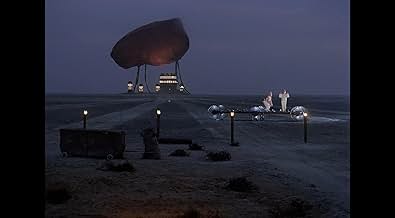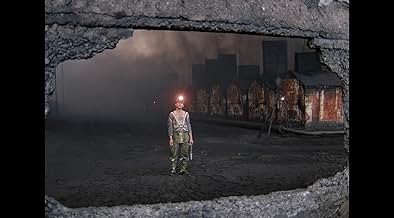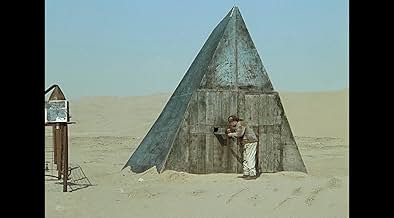VALUTAZIONE IMDb
7,9/10
14.151
LA TUA VALUTAZIONE
Aggiungi una trama nella tua linguaTwo Russians push the wrong button on a strange device and end up on the telepathic planet Pluke with its strange societal norms.Two Russians push the wrong button on a strange device and end up on the telepathic planet Pluke with its strange societal norms.Two Russians push the wrong button on a strange device and end up on the telepathic planet Pluke with its strange societal norms.
- Premi
- 3 vittorie e 1 candidatura
Irina Shmelyova
- Tsan - The Desert Stage-Cart Driver
- (as Irina Shmeleva)
Anatoliy Serenko
- The Space Drifter From Uzm
- (as A.Serenko)
Aleksandra Dorokhina
- The Huge Woman at Subway Station
- (as A. Dorokhina)
Olesya Ivanova
- A Fat Woman Settled Under the Ferris Wheel
- (as O. Ivanova)
Tatyana Novitskaya
- The Presentation Crystal Owner
- (as T. Novitskaya)
Tatyana Perfileva
- An old woman in a subway cart
- (as T.Perfilyeva)
Lyudmila Solodenko
- A Swarthy Woman Settled Under the Ferris Wheel
- (as L. Solodenko)
Galina Daneliya-Yurkova
- Lyudmila Mashkova - 'Lucia'
- (as G. Yurkova)
Igor Bogolyubov
- Lord PG's personal Patsak
- (as I.Bogolyubov)
Valentin Bukin
- A Desert-Patrol Ecilopp
- (as V.Bukin)
Yuriy Voronkov
- The Bearded Big Man at Subway Station
- (as Y. Voronkov)
Trama
Lo sapevi?
- QuizHalf the dialogue was ad-libbed.
- Citazioni
Uef: If I have a little KETSE, I have the right to wear yellow pants, and any Patsak should squat twice before me, not once. If a have a lot of KETSE, I have the right to wear crimson pants, so any Patsak should squat twice, any Chatlanin should make "ku", and Etsilopp can't beat me at night...
- ConnessioniFeatured in Ravnyaetsya odnomu Gaftu (2010)
- Colonne sonoreStrangers in the Night
(uncredited)
Written by Bert Kaempfert, Charles Singleton and Eddie Snyder
Performed by Levan Gabriadze
Recensione in evidenza
It is the 1980's, and Vladimir Mashkov is a foreman in Moscow. One day, while walking along Kalinin Prospekt- now New Arbat Avenue- he spots a peculiar barefooted man speaking about space, holding what he claims to be a teleportation device. Gedevan, a young violinist, also notices the man, and- sceptical but intrigued- they engage with the stranger, only to find themselves whisked away through space and time to a planet called Pluke. Will they be able to survive the strange societal norms of this far-away world, and can they ever make it back to earth?
Directed by Georgiy Daneliya, 'Kin-dza-dza!' is a wild science-fiction adventure that is like an interstellar 'Alice In Wonderland'. Written by Daneliya and Revaz Gabriadze, its narrative is both compelling and comedic, though also has thematic depth. As it unfolds, the film evolves from a quirky space adventure into a poignant critique of humanity. Daneliya and Gabriadze's storytelling is a balancing act of satire and sympathy, making the audience laugh while simultaneously provoking thought about deeper issues. They use the society on Pluke to satirise and comment upon the absurdities of our own societal norms and the often arbitrary nature of authority and power.
As Mashkov and Gedevan grapple with the planet's bizarre customs and language, viewers are invited to reflect on the peculiarities of human behaviour and the universal search for belonging and understanding. As they struggle to adapt to a world where the mundane becomes extraordinary and the illogical becomes law, the audience is drawn into a journey that is as much about self-discovery as it is about survival. The film masterfully intertwines the comedic with the critical, using the alien landscape as a mirror to our world. The characters' odyssey becomes a metaphor for the human condition, questioning what it means to be 'civilized' and challenging the viewer's perceptions of normalcy.
Moreover, the stark landscape of Pluke is a canvas upon which Daneliya and Gabriadze paint a scathing critique of discrimination and class difference. The inhabitants of the planet, divided by a rigid class system denoted by the colour of their pants, reflect the often unspoken yet deeply entrenched societal divisions of our own world. Daneliya does not shy away from depicting the absurdity of prejudice based on arbitrary markers, be it the colour of one's trousers or the circumstances of one's birth. Through the lens of science-fiction, the film invites viewers to confront the uncomfortable realities of inequality and the illogical nature of societal hierarchies.
It is also a technical achievement on every level. Aleksandr Samulekin and Teodor Tezhik's production design is a testament to their resourcefulness and creativity. Despite the constraints of a modest budget, they crafted a visual spectacle that rivals the grandeur of more lavishly funded sci-fi epics. The spacecrafts, seemingly cobbled together from spare parts, and the expansive interiors of private compounds, are not just set pieces but characters in their own right.
Furthermore, the environments of Pluke, from its barren landscapes to the intricately detailed interiors, serve as a canvas for the film's exploration of themes, such as resource scarcity and the stark divide between social classes. The clever use of everyday items repurposed into futuristic technology not only adds a layer of authenticity to the world-building but also mirrors the film's commentary on consumerism and waste.
In addition, cinematographer Pavel Lebeshev captures the desolation of Pluke with a palette that is both stark and expressive, complementing the film's tone astutely. His use of lighting and camera angles brings the barren environment to life, fostering a sense of isolation that mirrors the characters' internal struggles. The contrast between the starkness of the planet's surface and the occasional bursts of vibrant colour serves to highlight moments of hope and humanity in an otherwise bleak world.
Moreover, Lebeshev's skilful framing serves to isolate Mashkov and Gedevan within the vastness of the landscape, emphasizing their vulnerability and the daunting task of finding their way home. Yet, it is in these moments of solitude that the characters- and the audience- find a connection to the universal themes of resilience and companionship. In this way, Lebeshev's commendable work complements and aids the narrative perfectly.
Stanislav Lyubshin stars as Mashkov, opposite Levan Gabriadze as Gedevan and Yevgeny Leonov and Yury Yakovlev as two Plukanians who join in their quest. Lyubshin delivers a multifaceted performance that anchors the film's fantastical elements with a sense of everyman realism. His portrayal is a blend of bewilderment and determination, capturing the essence of a man torn from his world, yet striving to understand and overcome the challenges ahead of him.
Gabriadze's Gedevan is the perfect foil to Mashkov's stoicism. Gabriadze infuses his role with a youthful curiosity and an idealistic charm that resonates with the viewer's sense of adventure. His wide-eyed wonder and gradual character growth reflect the film's underlying message about the value of experience and the power of perspective. They share a brilliant chemistry, embodying the confusion and camaraderie that comes with being strangers in a strange land.
Leonov and Yakovlev, meanwhile, excel as the comedic aliens; delivering whimsical and wise performances, bringing both comedy and pathos to the tale. The dynamic between them is nothing short of delightful. Leonov's comedic genius shines through in his character's eccentricities and unexpected depth, while Yakovlev's delivers a masterclass in physical comedy and timing. Together, their characters provide not only levity but also a critical commentary on the nature of communication and misunderstanding.
A fun trip to a strange world, Georgiy Daneliya's 'Kin-dza-dza!' is a brilliant piece of science-fiction, that defies the confines of time and space. It resonates with viewers on multiple levels, featuring thematic depth, as well as bounteous humour. Containing stunning production design and striking cinematography, it is a truly original piece of work. Boasting strong performances from all in the cast that leave an indelible mark on the viewer's memory, 'Kin-dza-dza!' is truly out of this world.
Directed by Georgiy Daneliya, 'Kin-dza-dza!' is a wild science-fiction adventure that is like an interstellar 'Alice In Wonderland'. Written by Daneliya and Revaz Gabriadze, its narrative is both compelling and comedic, though also has thematic depth. As it unfolds, the film evolves from a quirky space adventure into a poignant critique of humanity. Daneliya and Gabriadze's storytelling is a balancing act of satire and sympathy, making the audience laugh while simultaneously provoking thought about deeper issues. They use the society on Pluke to satirise and comment upon the absurdities of our own societal norms and the often arbitrary nature of authority and power.
As Mashkov and Gedevan grapple with the planet's bizarre customs and language, viewers are invited to reflect on the peculiarities of human behaviour and the universal search for belonging and understanding. As they struggle to adapt to a world where the mundane becomes extraordinary and the illogical becomes law, the audience is drawn into a journey that is as much about self-discovery as it is about survival. The film masterfully intertwines the comedic with the critical, using the alien landscape as a mirror to our world. The characters' odyssey becomes a metaphor for the human condition, questioning what it means to be 'civilized' and challenging the viewer's perceptions of normalcy.
Moreover, the stark landscape of Pluke is a canvas upon which Daneliya and Gabriadze paint a scathing critique of discrimination and class difference. The inhabitants of the planet, divided by a rigid class system denoted by the colour of their pants, reflect the often unspoken yet deeply entrenched societal divisions of our own world. Daneliya does not shy away from depicting the absurdity of prejudice based on arbitrary markers, be it the colour of one's trousers or the circumstances of one's birth. Through the lens of science-fiction, the film invites viewers to confront the uncomfortable realities of inequality and the illogical nature of societal hierarchies.
It is also a technical achievement on every level. Aleksandr Samulekin and Teodor Tezhik's production design is a testament to their resourcefulness and creativity. Despite the constraints of a modest budget, they crafted a visual spectacle that rivals the grandeur of more lavishly funded sci-fi epics. The spacecrafts, seemingly cobbled together from spare parts, and the expansive interiors of private compounds, are not just set pieces but characters in their own right.
Furthermore, the environments of Pluke, from its barren landscapes to the intricately detailed interiors, serve as a canvas for the film's exploration of themes, such as resource scarcity and the stark divide between social classes. The clever use of everyday items repurposed into futuristic technology not only adds a layer of authenticity to the world-building but also mirrors the film's commentary on consumerism and waste.
In addition, cinematographer Pavel Lebeshev captures the desolation of Pluke with a palette that is both stark and expressive, complementing the film's tone astutely. His use of lighting and camera angles brings the barren environment to life, fostering a sense of isolation that mirrors the characters' internal struggles. The contrast between the starkness of the planet's surface and the occasional bursts of vibrant colour serves to highlight moments of hope and humanity in an otherwise bleak world.
Moreover, Lebeshev's skilful framing serves to isolate Mashkov and Gedevan within the vastness of the landscape, emphasizing their vulnerability and the daunting task of finding their way home. Yet, it is in these moments of solitude that the characters- and the audience- find a connection to the universal themes of resilience and companionship. In this way, Lebeshev's commendable work complements and aids the narrative perfectly.
Stanislav Lyubshin stars as Mashkov, opposite Levan Gabriadze as Gedevan and Yevgeny Leonov and Yury Yakovlev as two Plukanians who join in their quest. Lyubshin delivers a multifaceted performance that anchors the film's fantastical elements with a sense of everyman realism. His portrayal is a blend of bewilderment and determination, capturing the essence of a man torn from his world, yet striving to understand and overcome the challenges ahead of him.
Gabriadze's Gedevan is the perfect foil to Mashkov's stoicism. Gabriadze infuses his role with a youthful curiosity and an idealistic charm that resonates with the viewer's sense of adventure. His wide-eyed wonder and gradual character growth reflect the film's underlying message about the value of experience and the power of perspective. They share a brilliant chemistry, embodying the confusion and camaraderie that comes with being strangers in a strange land.
Leonov and Yakovlev, meanwhile, excel as the comedic aliens; delivering whimsical and wise performances, bringing both comedy and pathos to the tale. The dynamic between them is nothing short of delightful. Leonov's comedic genius shines through in his character's eccentricities and unexpected depth, while Yakovlev's delivers a masterclass in physical comedy and timing. Together, their characters provide not only levity but also a critical commentary on the nature of communication and misunderstanding.
A fun trip to a strange world, Georgiy Daneliya's 'Kin-dza-dza!' is a brilliant piece of science-fiction, that defies the confines of time and space. It resonates with viewers on multiple levels, featuring thematic depth, as well as bounteous humour. Containing stunning production design and striking cinematography, it is a truly original piece of work. Boasting strong performances from all in the cast that leave an indelible mark on the viewer's memory, 'Kin-dza-dza!' is truly out of this world.
- reelreviewsandrecommendations
- 14 mag 2024
- Permalink
I più visti
Accedi per valutare e creare un elenco di titoli salvati per ottenere consigli personalizzati
- How long is Kin-dza-dza!?Powered by Alexa
Dettagli
- Data di uscita
- Paese di origine
- Lingue
- Celebre anche come
- Кін-дза-дза!
- Luoghi delle riprese
- 26 New Arbat Avenue, Mosca, Russia(Vladimir and Gedevan meet the barefoot man)
- Azienda produttrice
- Vedi altri crediti dell’azienda su IMDbPro
Botteghino
- Lordo in tutto il mondo
- 23.902 USD
Contribuisci a questa pagina
Suggerisci una modifica o aggiungi i contenuti mancanti

Divario superiore
By what name was Kin-dza-dza! (1986) officially released in India in English?
Rispondi





























